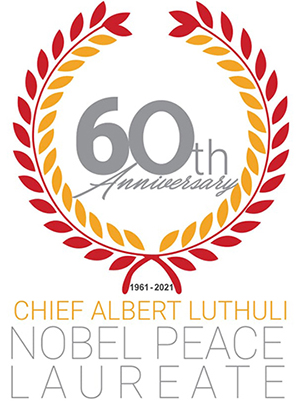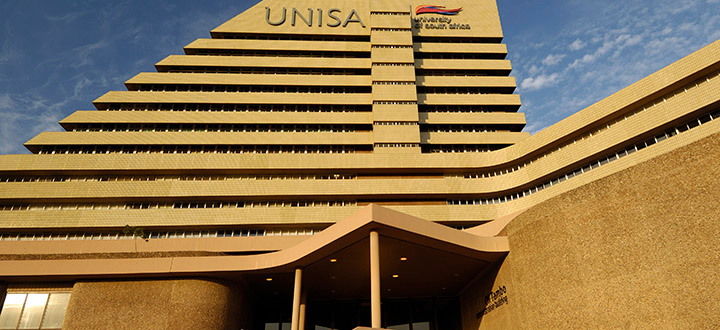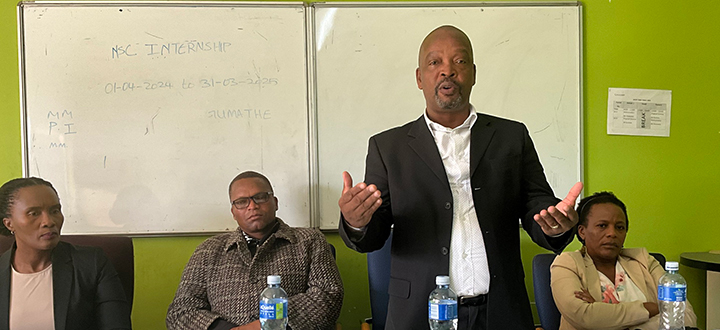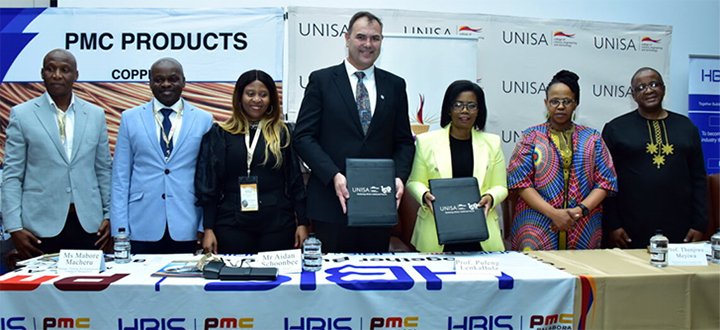College of Human Sciences
Honouring Nkosi Albert Luthuli, a model African ancestor
 In 1960, Chief Albert Luthuli was the first African to receive the Nobel Peace Prize award for advocating non-violent resistance to racial discrimination. When accepting the award in Oslo, Norway, he proudly donned traditional Zulu attire as a way of paying respect to his culture and tradition. Many decades later, the spirit of Chief Albert Luthuli is still reflected on and remembered due to the significance of the symbolic cultural meaning it has for South African and African communities.
In 1960, Chief Albert Luthuli was the first African to receive the Nobel Peace Prize award for advocating non-violent resistance to racial discrimination. When accepting the award in Oslo, Norway, he proudly donned traditional Zulu attire as a way of paying respect to his culture and tradition. Many decades later, the spirit of Chief Albert Luthuli is still reflected on and remembered due to the significance of the symbolic cultural meaning it has for South African and African communities.
It was this spirit that was invoked during the inaugural lecture of a three-part seminar series honouring the late teacher, activist and politician. The seminar series is being held by the Unisa Chief Albert Luthuli Research Chair, housed in the College of Human Sciences.
Explaining the theme, "Invoking the spirit of Chief Albert Luthuli - the importance of cultural diplomacy", incumbent of the Chair, Prof Puleng Segalo, said it is part of the broader legacy project of honouring the memory of Chief Luthuli. "Unisa, as part of its recognition of Chief Luthuli’s role in fighting for liberation and peace globally, made a formal commitment to honour his memory and legacy through the establishment of this research chair. This is also a progressive partnership with the Luthuli Museum, and I would like to acknowledge our colleagues from the museum."
Prof Segalo said that Unisa takes seriously the project of decolonisation and Africanisation, therefore, the university’s vision connects very well with Chief Luthuli’s vision of forging global solidarity and striving for social justice and equality for all. "The Chair hopes to afford a space for critical engagement between established and emerging scholars, students, comrades, and organic intellectuals and communities that seek to radicalise our academic spaces. We hope, as the Chair, to engage with ways in which Africa and its challenges and possibilities could be tackled. The Chair aims also add engaging with diverse voices that may assist in providing a vocabulary that could be used to deal with social political, cultural and historical issues that make themselves visible in this current moment."
She said at its core, cultural diplomacy is about a country or countries sending cultural messages about themselves to other countries to counter the alienation between people of different nations and to develop mutual understanding. "The legacy of political figures like Chief Luthuli, reminds us of how much value there is in acknowledging and recognising the humanity of others. While insisting on the value of his own humanity, and that of the oppressed South Africans of colour, Nkosi (Chief) Luthuli also managed to build bridges that had boundless impact. Such legacies call upon us to also see how much acknowledging and recognising the humanity of others is generative. Creating networks that spur progress for the here and now, as well as for the long haul."
A man of proud heritage with a gentle and humble spirit
Prof Segalo said that Chief Luthuli may have intended to build global political networks by engaging in various international correspondences and by his acceptance of accolades bestowed upon on him by other countries. She added that when he received the Nobel Peace Prize on the global stage dressed in traditional Zulu attire, he represented not only his political ideology and ideals, but also the values and identity of a people, sending cultural messages to the world, "compelling it to not only view him as a political force by to also accept him as a man of heritage".
It was within this framework that the panellists of the first seminar series spoke from. Panellists included Dr Gcina Mhlophe (poet, storyteller, playwright and author), James Ngcobo (actor, playwright and artistic director), Dr Akhona Ndzuta (post-doctoral fellow at the Chief Albert Luthuli Research Chair) and Saul Kgomotso Molobi (Group Chief Executive Officer and Chairman, Brandhill Africa). Other speakers included Prof Zethu Nkosi (Deputy Executive Dean, College of Human Sciences) who welcomed guests to the online series and Prof Azwihangwisi Mavhandu-Mudzusi (Head of Research and Graduate Studies, College of Human Sciences) who delivered the vote of thanks.
Dr Mhlophe remembered and reminded guests of Chief Luthuli’s gentle and humble spirit. "He was clear about what he stood for, he always was clear about where he was going and what he wanted to see happening in a free South Africa. And that is extremely important as sometimes people mistake a person’s gentle and humble spirit for a weakness, and it was far from being a weakness."
She said that Chief Luthuli was a good listener and that South Africans, Africans and the world at large must be grateful to have had a leader like that. However, she reminded us that he was not just a political leader, he was a husband, a father, a community builder. "He was a person who wanted the people to know that they belong to an amazing continent, a place of beginning, a place where people have had leadership and inventions and so many milestones from the beginning of time. He never shied away from standing tall in who he was. That's the challenge with some people, they ignore or don't recognise their own power because they assume they do not have any power and he should be the name that reignites the power in each and every one of us."
Dr Mhlophe also brought in the spirit and memory of Nokukhanya Luthuli (also known as MaBhengu), as she also played a critical role in the South African liberation struggle as did many of the other wives and women of the anti-apartheid struggle. She then read one of her poems, Praise to Our Mothers, honouring their contributions, highlighting that it is very important for memories of our history to be told through stories and song.
Our greatest teacher to this day
The next speaker was Ngcobo who highlighted that Chief Luthuli was located in rich African tradition. "Unlike the inventions of the divide and rule system that British colonialism imposed on Africans, consequently leaving scars and divisions whose brutal traumas can remain to this day, I want to begin from a premise that Nkosi (Chief) Luthuli is our lodestar, a model African ancestor. If we humble ourselves enough to hear his voice, and learn from him, then from him we can be better people, as individuals and leaders in different walks of our lives."
Ngcobo said that the seminar formed part of a deliberate clarion call for all of us to revisit Chief Luthuli’s courageous walk and walk with him towards the realisation of a better country and a better Africa for all. "We have no excuses to fail the people, to normalise systemic poverty and squalor. We have no excuse whatsoever to betray the highest modern values set by Chief Luthuli, our greatest teacher of human dignity and human solidarity. Chief Luthuli’s plans continue to show us the way, to guide us, if we have the humility and the moral conscience to let him speak and share his message of connection and healing and liberation in our country."
He added: "I also would like college to raise a litany of questions today questions that stare us with eyes of fire in our country at the present landscape that we are navigating. Where are we, who are we, for whom do we speak, sing, cry and write? What animates our lives and keeps us awake at night?" Ngcobo said when Chief Luthuli was awarded the Nobel Peace Prize, he called on the world to redouble their efforts in the struggle for peace and friendship. "Chief Luthuli was deeply conscious of the added responsibility which the award entailed, noting that 'I have the feeling that I've been made answerable for the future of the people of South Africa for if there is no peace for many of them there is no peace for anyone'."
Furthermore, Ngcobo said that Chief Luthuli, to this day, remains our greatest teacher. "He teaches us human compassion; global human solidarity; peace and justice in this world; justice for Black South Africans; and justice for the dispossessed and the oppressed, racially and economically. He was an African leader who loved and respected the continent. He dreamt of freedom from the shackles that held us in bondage and denied us our basic humanity. He proudly and gracefully walked this beautiful land, speaking with South Africans across race and ethnicity in freedom’s name.
"I would like also to add that when you look at a figure like Chief Luthuli, you then realise the commitment to society was a pivot of his leadership. This exemplary African ancestor remains one of our greatest teachers to this day, we can still see his big smile and moving eloquence as he talks to us about our varied and often cruel modern dilemmas. He’s talking to the perennial issues of race-based injustices, gender-based violence, xenophobia and Afrophobia, challenges in both the public and the private sector. If it wasn't really a train that crushed his bones, it will be us who will crush his vision and his dreams by doing wrong, choosing silence in the face of betrayal of our collective dreams for a better and equal society."
Chief Luthuli encouraged interconnectedness amongst nations
Dr Ndzuta presented on the South African Arts Festival in Los Angeles, an experiment in cultural diplomacy. In doing so, she demonstrated how the festival held value in creating space for the promotion of social cohesion and national culture but also the importance of the involvement of various stakeholders in the planning and decisions around the festival. She highlighted the possibilities that such cultural events hold.
She said that the South African Art Festival in Los Angeles was an implicit and explicit commentary on South Africa’s national identity and attempted to shape opinions about South Africa to foreign audiences through culture. “Whether this experiment was successful or not is not clear. The festival however was not only a test of the reception of South African music by USA audiences, but of what is possible in a temporary space for long term impact.
“The festival was first an indication that the government prioritised the instrumentalisation of national culture for economic reasons locally and abroad, and second, it was an indication of the possibilities when more focused Department of Arts and Culture (DAC) and Department of International Relations and Cooperation (DIRCO) policy collaborations happened.”
Dr Ndzuta added: “Simultaneously though, it raised questions about how cultural stakeholders could work more effectively with the government for purposes of national development, global influence as well as the national interest, in ways that transcend the immediate goals of economic development. This is particularly interesting when considering that cultural sector workers especially those invited to participate in the festival were not consulted about their interest during the planning enactment of the festival and so much of the activities of the festival became about whose interests are more legitimate in cultural diplomacy spaces and exercises.”
She said the festival also made statements about prominent themes and Chief Luthuli’s legacy. “Some of these where about education, interconnectedness and national reconstruction. The value of education for the sake of progress, is a theme that relates to the limited investments DAC made in the skills transfer workshops.
"Enhancing interconnectedness amongst other nations through cultural diplomacy programmes is a theme that was not only embodied in Chief Luthuli’s Nobel Prize but in his addressing of uneven power dynamics between countries and his confrontation of race related social justice and countries like the USA." She highlighted the ties that bind the two nations by reminding the audience of a letter that Chief Luthuli penned to the United Nations with Martin Luther King Junior for action to be taken against apartheid through economic sanctions.
Dr Ndzuta added: "The festival also involved issues of self-determination and how we imagine this self-determination through policy strategy in our post-apartheid national reconstruction. Chief Luthuli for instance held firm on his identity and heritage in South Africa and abroad while advancing the cause for liberation. The political messages of South African culture at the festival on the other hand suggests that in South Africa’s pursuit for hard power it may run the risk of assimilation and possibly erasure."
Africans need to be very deliberate and disobedient in their creativity
The last speaker was Molobi who provided an insightful talk and an in-depth historical excavation reminding the audience that history is a deliberate act. Molobi said that Chief Luthuli’s autobiography, Let my people go, (which politically conscientised Molobi as a young man), demonstrates that Chief Luthuli was a public diplomat. In the book, Charles Hooper writes in the introduction that the Chief’s gifts of imagination, his extraordinary power of entering the minds and emotions of other people, set him apart from all other leaders. "His assurance is so deeply grounded in intellectually humanity that it's not possible to distinguish one from the other. Assurance without arrogance and the humility of a man who cannot be humiliated, this is a rare combination," wrote Hooper.
Molobi said the complexity and depth of Chief Luthuli’s personality was uniquely nuanced, but he also believes that it showcases the identity the Chief forged, not only for himself, but also for his organisation, the African National Congress (ANC). "While he made a statement by being dressed in his traditional isiZulu regalia at an international award ceremony, and his identity was premised on an isiZulu tradition, it has evolved to be dependent on a postmodernist African epistemology. He was an African who was a full citizen of the global world, a product for cross pollination between his South African and global characters."
He said for South Africa and Africa’s services, products and corporates to succeed, not just in capturing the African consumer markets, but global too, there has to be sufficient resources invested into building them into brands and using public diplomacy as delivery vehicle.
Molobi said for this to happen, an identity needs to be created and this does not happen by chance but rather has to be carefully planned and executed close. He said iconic brands tell stories that resonate with consumers and citizens and touch their lives in some way. "So now how can we in Africa follow this brand development framework? We have many icons, myths and legends we can borrow from. Chief Luthuli is key among those."
He concluded by stating that South Africa and the continent has a lot of work to do. His recommendation to all the brand architects in Africa is that we need to start conducting extensive customer research, segmentation and positioning – public diplomacy becoming the call of every country’s foreign policy. “Comprehensive stakeholder engagement through a well-defined public diplomacy strategy, embracing social media as part of the overall marketing communication strategy, and administering a comprehensive customer relationship management, this will indeed catapult African countries and companies into highly competitive machinery that will stand their ground against foreign brands. This will ensure, as we implement the Africa continental free trade agreement, that indeed, Made in Africa service and product brands do benefit and tap into the market."
* Written by Rivonia Naidu-Hoffmeester
The second seminar is scheduled for 15 September 2021. Click here for the programme.
Teaser image: news24 (www.news24.com)
Publish date: 2021-09-15 00:00:00.0

 Unisa remains anchored among the waves
Unisa remains anchored among the waves
 Inhlanyelo Hub explores sustainable tourism initiatives in Marico Biosphere Reserve
Inhlanyelo Hub explores sustainable tourism initiatives in Marico Biosphere Reserve
 Unisa KZN Region explores extending university services to KwaMpungose community
Unisa KZN Region explores extending university services to KwaMpungose community
 Unisa's catalytic niche areas provide industry-focused mining innovations
Unisa's catalytic niche areas provide industry-focused mining innovations